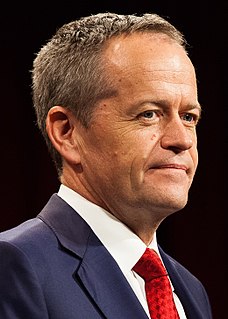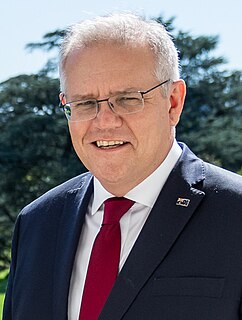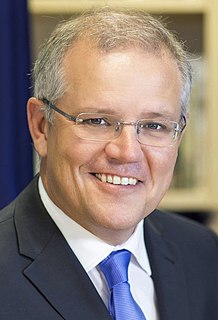
Republicanism in Australia is a movement to change Australia's system of government from a constitutional parliamentary monarchy to a republic, replacing the monarch of Australia with a president. Republicanism was first espoused in Australia before Federation in 1901. After a period of decline after Federation, the movement again became prominent at the end of the 20th century after successive legal and socio-cultural changes loosened Australia's ties with the United Kingdom.

Anthony Norman Albanese is an Australian politician serving as Leader of the Opposition and leader of the Australian Labor Party (ALP) since 2019. He has been member of parliament (MP) for the division of Grayndler since 1996. Albanese was deputy prime minister of Australia under the second Rudd Government in 2013 and a Cabinet Minister in the Rudd and Gillard Governments from 2007 to 2013.

Tanya Joan Plibersek is an Australian politician who served as Deputy Leader of the Labor Party and Deputy Leader of the Opposition from 2013 to 2019. She has served as the Member of Parliament (MP) for Sydney since 1998. A member of the Labor Party, Plibersek served as a Cabinet Minister in the Rudd and Gillard Governments. She is currently the Shadow Minister for Education and Shadow Minister for Women.

The 2007 Australian federal election was held in Australia on 24 November 2007. All 150 seats in the House of Representatives and 40 of the seats in the 76-member Senate were up for election. The election featured a 39-day campaign, with 13.6 million Australians enrolled to vote.

Christopher Eyles Guy Bowen is an Australian politician. He is a member of the Australian Labor Party (ALP) and was first elected to parliament at the 2004 federal election. He held ministerial office in the Rudd and Gillard Governments from 2007 to 2013 and has been a senior member of shadow cabinet since 2013. He is currently the Shadow Minister for Climate Change and Energy since January 2021.

William Richard Shorten is an Australian politician who served as Leader of the Opposition and Leader of the Labor Party from 2013 to 2019. Shorten was first elected as the Member of Parliament (MP) for Maribyrnong in 2007, and was a Cabinet Minister in the Gillard and Rudd Governments from 2010 to 2013.

Scott John Morrison is an Australian politician serving as the 30th and current prime minister of Australia. He assumed office in August 2018 upon his election as leader of the Liberal Party of Australia.

Craig Kelly is an Australian politician, who has served as the leader of the United Australia Party (UAP) since August 2021.

The 2016 Australian federal election was a double dissolution election held on Saturday 2 July to elect all 226 members of the 45th Parliament of Australia, after an extended eight-week official campaign period. It was the first double dissolution election since the 1987 election and the first under a new voting system for the Senate that replaced group voting tickets with optional preferential voting.

Angus Taylor is an Australian politician who is the Minister for Energy and Emissions Reduction. He is a member of the Liberal Party of Australia and has sat in the Australian House of Representatives for the Division of Hume since 2013. Taylor previously served as the Minister for Law Enforcement and Cybersecurity from 2017 to 2018.

Linda Karen Reynolds is an Australian politician serving as Minister for Government Services and Minister for the National Disability Insurance Scheme since 2021. She is a member of the Liberal Party and has served as a Senator for Western Australia since 2014.

The 2019 New South Wales state election was held on Saturday 23 March 2019 to elect the 57th Parliament of New South Wales, including all 93 seats in the Legislative Assembly and 21 of the 42 seats in the Legislative Council. The election was conducted by the New South Wales Electoral Commission (NSWEC).

The Turnbull government was the federal executive government of Australia led by the 29th prime minister of Australia, Malcolm Turnbull, from 2015 to 2018. It succeeded the Abbott government, which brought the Coalition to power at the 2013 Australian federal election. The government consisted of members of Australia's Liberal-Nationals Coalition. Turnbull took office by challenging his leader, Tony Abbott, in an internal leadership ballot. Warren Truss, the leader of the Nationals, served as Deputy Prime Minister until he retired in 2016 and was replaced by Barnaby Joyce. Joyce resigned in February 2018 and the Nationals' new leader Michael McCormack became Deputy Prime Minister. The Turnbull government concluded with Turnbull's resignation ahead of internal leadership ballot which saw him succeeded as Prime Minister by Scott Morrison and the Morrison government.

The 2019 Australian federal election was held on Saturday 18 May 2019 to elect members of the 46th Parliament of Australia. The election had been called following the dissolution of the 45th Parliament as elected at the 2016 double dissolution federal election. All 151 seats in the House of Representatives and 40 of the 76 seats in the Senate were up for election.
The Australian federal election debates of 2016 consisted of a series of leaders' debates between the leaders of the two main parties contesting the 2016 Australian federal election: Malcolm Turnbull, Prime Minister and leader of the Liberal Party; and Bill Shorten, Leader of the Opposition and Labor Party. Other debates, between portfolio spokespeople for example, were also held.

The 2021 Tasmanian state election was held on 1 May 2021 to elect all 25 members to the Tasmanian House of Assembly.

The 2018 Australian federal budget was the federal budget to fund government services and operations for the 2018–19 financial year. The budget was presented to the House of Representatives by Treasurer Scott Morrison on 8 May 2018. It was the fifth budget to be handed down by the Liberal/National Coalition since their election to government at the 2013 federal election, and the third and final budget to be handed down by Morrison and the Turnbull Government.
Leadership spills of the federal parliamentary leadership of the Liberal Party of Australia were held on 21 and 24 August 2018 and were called by the incumbent leader of the party, Prime Minister Malcolm Turnbull.

The Morrison government is the current federal executive government of Australia, led by Prime Minister Scott Morrison of the Liberal Party of Australia. The Morrison Government commenced on 24 August 2018, when it was sworn in by the Governor-General of Australia. It is composed of members of the Liberal–National Coalition and succeeds the Abbott (2013-2015) and Turnbull (2015-2018) Coalition Governments in office, competing against the Australian Labor Party as the major Opposition party. Nationals Leader Michael McCormack served as Deputy Prime Minister of Australia from the formation of the Morrison Government until June 2021. He was replaced as Leader of the Nationals and Deputy Prime Minister by the incumbent Barnaby Joyce.

The 2022 Australian federal election will be held on 21 May 2022 to elect members of the 47th Parliament of Australia.















